Worldview Reflection: Christian Spirituality, Scientism, and Ethics
VerifiedAdded on 2023/01/19
|8
|2327
|62
Essay
AI Summary
This assignment presents a comprehensive reflection on worldview, addressing key philosophical questions and exploring the intersection of Christian spirituality, scientism, and personal ethics. The essay begins by contrasting the Christian perspective on spirituality and ethics with postmodern relativism within healthcare, highlighting the tensions and differences in beliefs. It then defines scientism, discussing its core tenets and presenting two major arguments against its claims. The core of the assignment involves a personal exploration of fundamental worldview questions, including the nature of ultimate reality, the universe, human beings, knowledge, ethics, and the purpose of existence. Each question is answered from a personal perspective, supported by philosophical reasoning and insights. The reflection demonstrates a deep understanding of the concepts, providing a detailed and insightful analysis of the student's personal worldview.
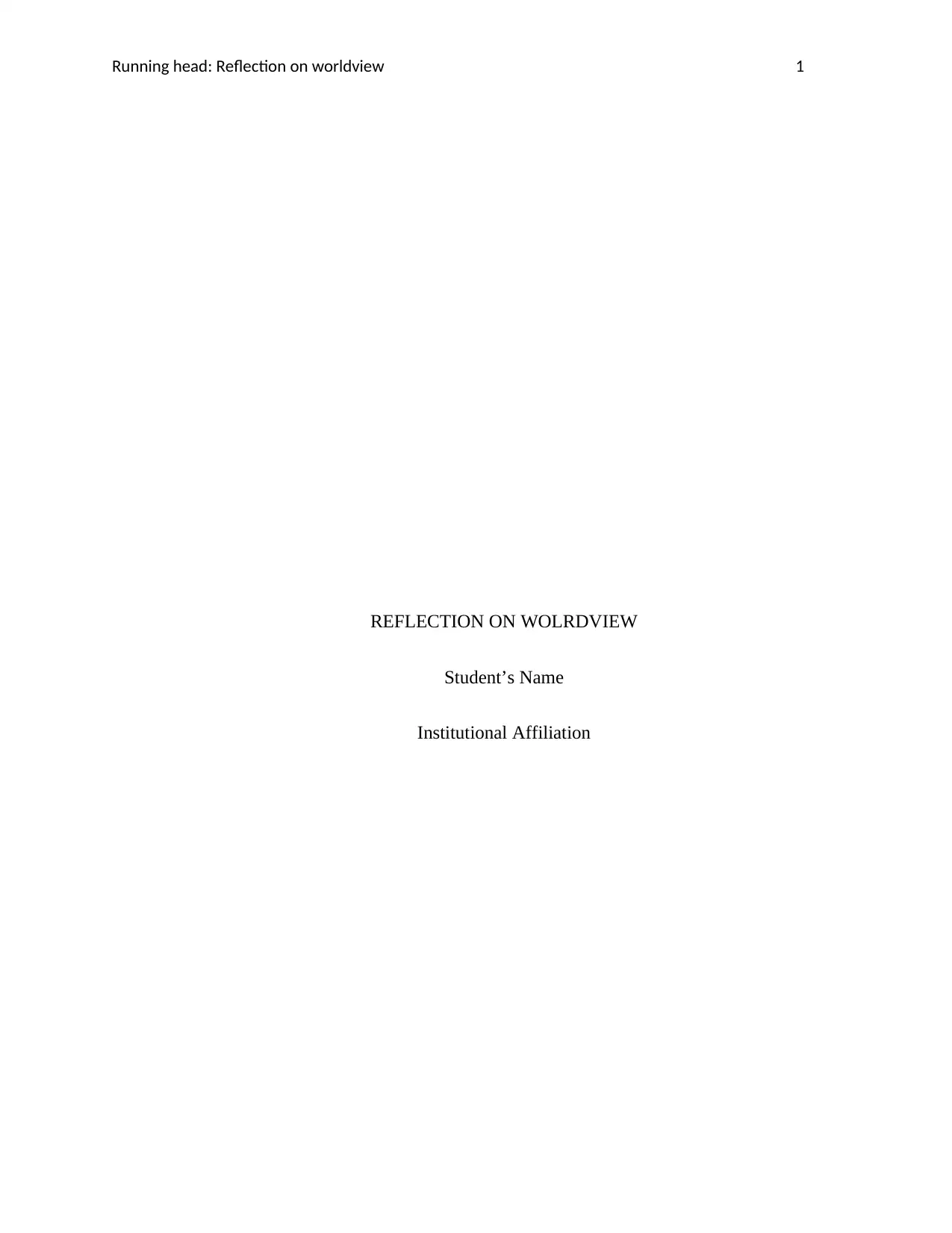
Running head: Reflection on worldview 1
REFLECTION ON WOLRDVIEW
Student’s Name
Institutional Affiliation
REFLECTION ON WOLRDVIEW
Student’s Name
Institutional Affiliation
Paraphrase This Document
Need a fresh take? Get an instant paraphrase of this document with our AI Paraphraser
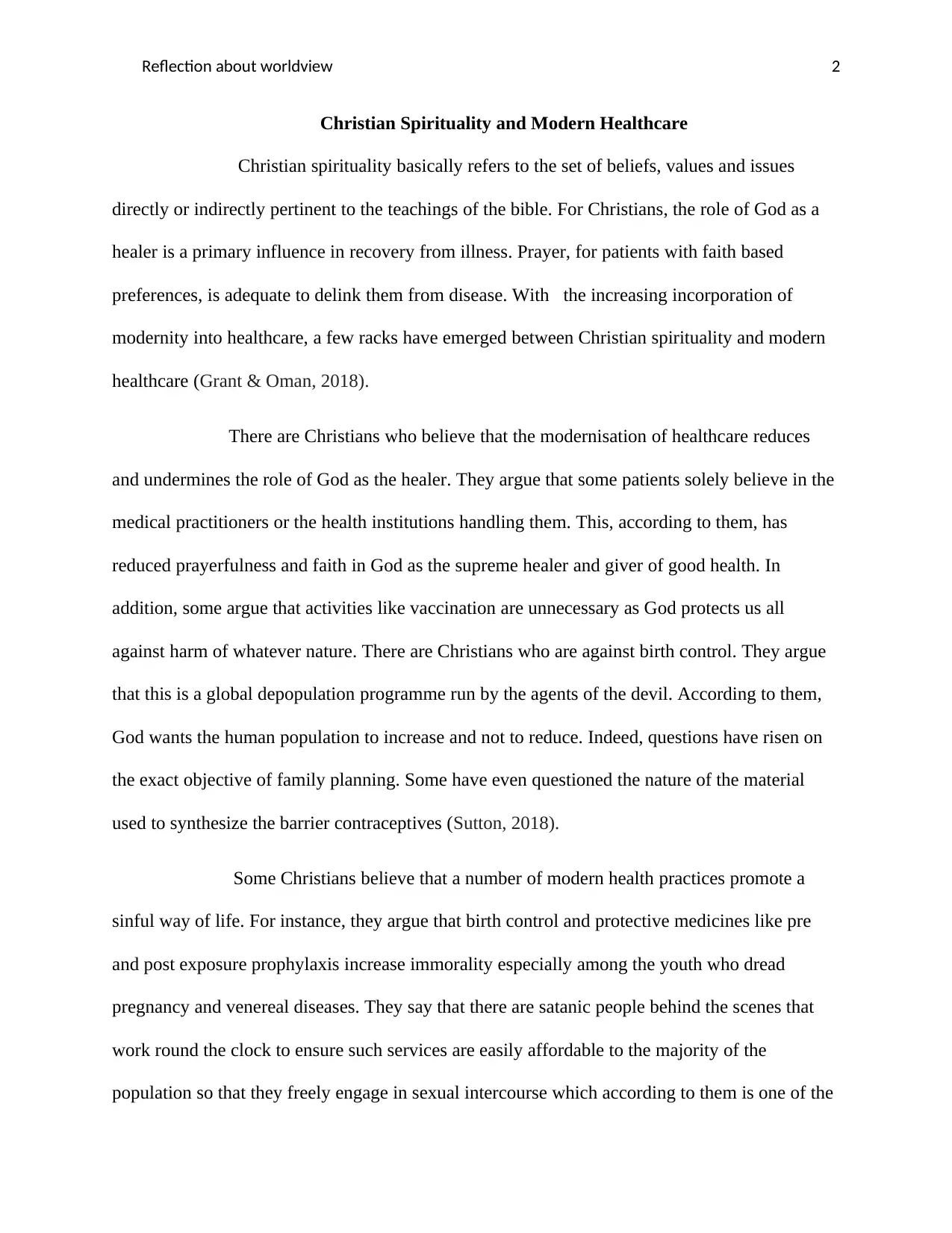
Reflection about worldview 2
Christian Spirituality and Modern Healthcare
Christian spirituality basically refers to the set of beliefs, values and issues
directly or indirectly pertinent to the teachings of the bible. For Christians, the role of God as a
healer is a primary influence in recovery from illness. Prayer, for patients with faith based
preferences, is adequate to delink them from disease. With the increasing incorporation of
modernity into healthcare, a few racks have emerged between Christian spirituality and modern
healthcare (Grant & Oman, 2018).
There are Christians who believe that the modernisation of healthcare reduces
and undermines the role of God as the healer. They argue that some patients solely believe in the
medical practitioners or the health institutions handling them. This, according to them, has
reduced prayerfulness and faith in God as the supreme healer and giver of good health. In
addition, some argue that activities like vaccination are unnecessary as God protects us all
against harm of whatever nature. There are Christians who are against birth control. They argue
that this is a global depopulation programme run by the agents of the devil. According to them,
God wants the human population to increase and not to reduce. Indeed, questions have risen on
the exact objective of family planning. Some have even questioned the nature of the material
used to synthesize the barrier contraceptives (Sutton, 2018).
Some Christians believe that a number of modern health practices promote a
sinful way of life. For instance, they argue that birth control and protective medicines like pre
and post exposure prophylaxis increase immorality especially among the youth who dread
pregnancy and venereal diseases. They say that there are satanic people behind the scenes that
work round the clock to ensure such services are easily affordable to the majority of the
population so that they freely engage in sexual intercourse which according to them is one of the
Christian Spirituality and Modern Healthcare
Christian spirituality basically refers to the set of beliefs, values and issues
directly or indirectly pertinent to the teachings of the bible. For Christians, the role of God as a
healer is a primary influence in recovery from illness. Prayer, for patients with faith based
preferences, is adequate to delink them from disease. With the increasing incorporation of
modernity into healthcare, a few racks have emerged between Christian spirituality and modern
healthcare (Grant & Oman, 2018).
There are Christians who believe that the modernisation of healthcare reduces
and undermines the role of God as the healer. They argue that some patients solely believe in the
medical practitioners or the health institutions handling them. This, according to them, has
reduced prayerfulness and faith in God as the supreme healer and giver of good health. In
addition, some argue that activities like vaccination are unnecessary as God protects us all
against harm of whatever nature. There are Christians who are against birth control. They argue
that this is a global depopulation programme run by the agents of the devil. According to them,
God wants the human population to increase and not to reduce. Indeed, questions have risen on
the exact objective of family planning. Some have even questioned the nature of the material
used to synthesize the barrier contraceptives (Sutton, 2018).
Some Christians believe that a number of modern health practices promote a
sinful way of life. For instance, they argue that birth control and protective medicines like pre
and post exposure prophylaxis increase immorality especially among the youth who dread
pregnancy and venereal diseases. They say that there are satanic people behind the scenes that
work round the clock to ensure such services are easily affordable to the majority of the
population so that they freely engage in sexual intercourse which according to them is one of the
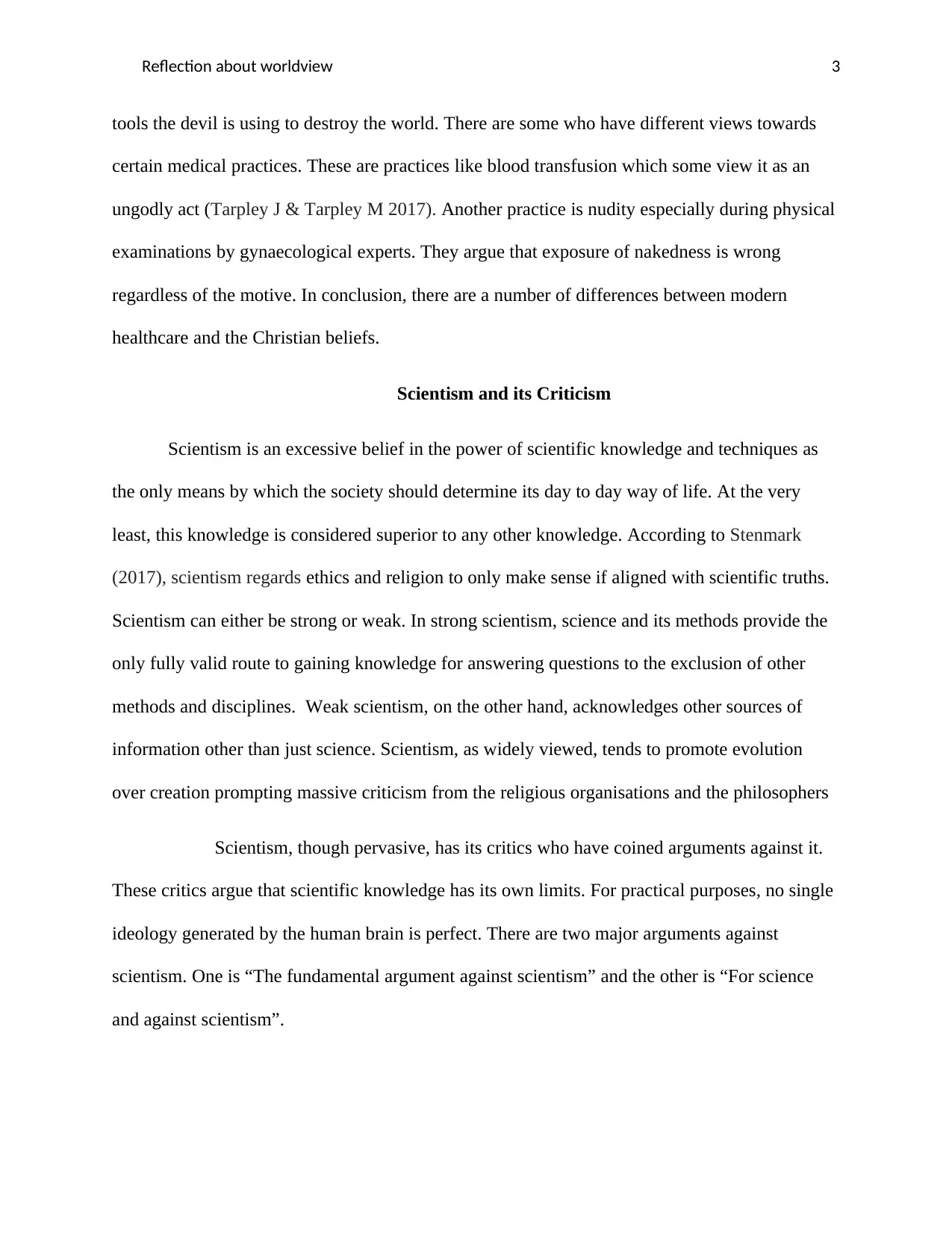
Reflection about worldview 3
tools the devil is using to destroy the world. There are some who have different views towards
certain medical practices. These are practices like blood transfusion which some view it as an
ungodly act (Tarpley J & Tarpley M 2017). Another practice is nudity especially during physical
examinations by gynaecological experts. They argue that exposure of nakedness is wrong
regardless of the motive. In conclusion, there are a number of differences between modern
healthcare and the Christian beliefs.
Scientism and its Criticism
Scientism is an excessive belief in the power of scientific knowledge and techniques as
the only means by which the society should determine its day to day way of life. At the very
least, this knowledge is considered superior to any other knowledge. According to Stenmark
(2017), scientism regards ethics and religion to only make sense if aligned with scientific truths.
Scientism can either be strong or weak. In strong scientism, science and its methods provide the
only fully valid route to gaining knowledge for answering questions to the exclusion of other
methods and disciplines. Weak scientism, on the other hand, acknowledges other sources of
information other than just science. Scientism, as widely viewed, tends to promote evolution
over creation prompting massive criticism from the religious organisations and the philosophers
Scientism, though pervasive, has its critics who have coined arguments against it.
These critics argue that scientific knowledge has its own limits. For practical purposes, no single
ideology generated by the human brain is perfect. There are two major arguments against
scientism. One is “The fundamental argument against scientism” and the other is “For science
and against scientism”.
tools the devil is using to destroy the world. There are some who have different views towards
certain medical practices. These are practices like blood transfusion which some view it as an
ungodly act (Tarpley J & Tarpley M 2017). Another practice is nudity especially during physical
examinations by gynaecological experts. They argue that exposure of nakedness is wrong
regardless of the motive. In conclusion, there are a number of differences between modern
healthcare and the Christian beliefs.
Scientism and its Criticism
Scientism is an excessive belief in the power of scientific knowledge and techniques as
the only means by which the society should determine its day to day way of life. At the very
least, this knowledge is considered superior to any other knowledge. According to Stenmark
(2017), scientism regards ethics and religion to only make sense if aligned with scientific truths.
Scientism can either be strong or weak. In strong scientism, science and its methods provide the
only fully valid route to gaining knowledge for answering questions to the exclusion of other
methods and disciplines. Weak scientism, on the other hand, acknowledges other sources of
information other than just science. Scientism, as widely viewed, tends to promote evolution
over creation prompting massive criticism from the religious organisations and the philosophers
Scientism, though pervasive, has its critics who have coined arguments against it.
These critics argue that scientific knowledge has its own limits. For practical purposes, no single
ideology generated by the human brain is perfect. There are two major arguments against
scientism. One is “The fundamental argument against scientism” and the other is “For science
and against scientism”.
⊘ This is a preview!⊘
Do you want full access?
Subscribe today to unlock all pages.

Trusted by 1+ million students worldwide
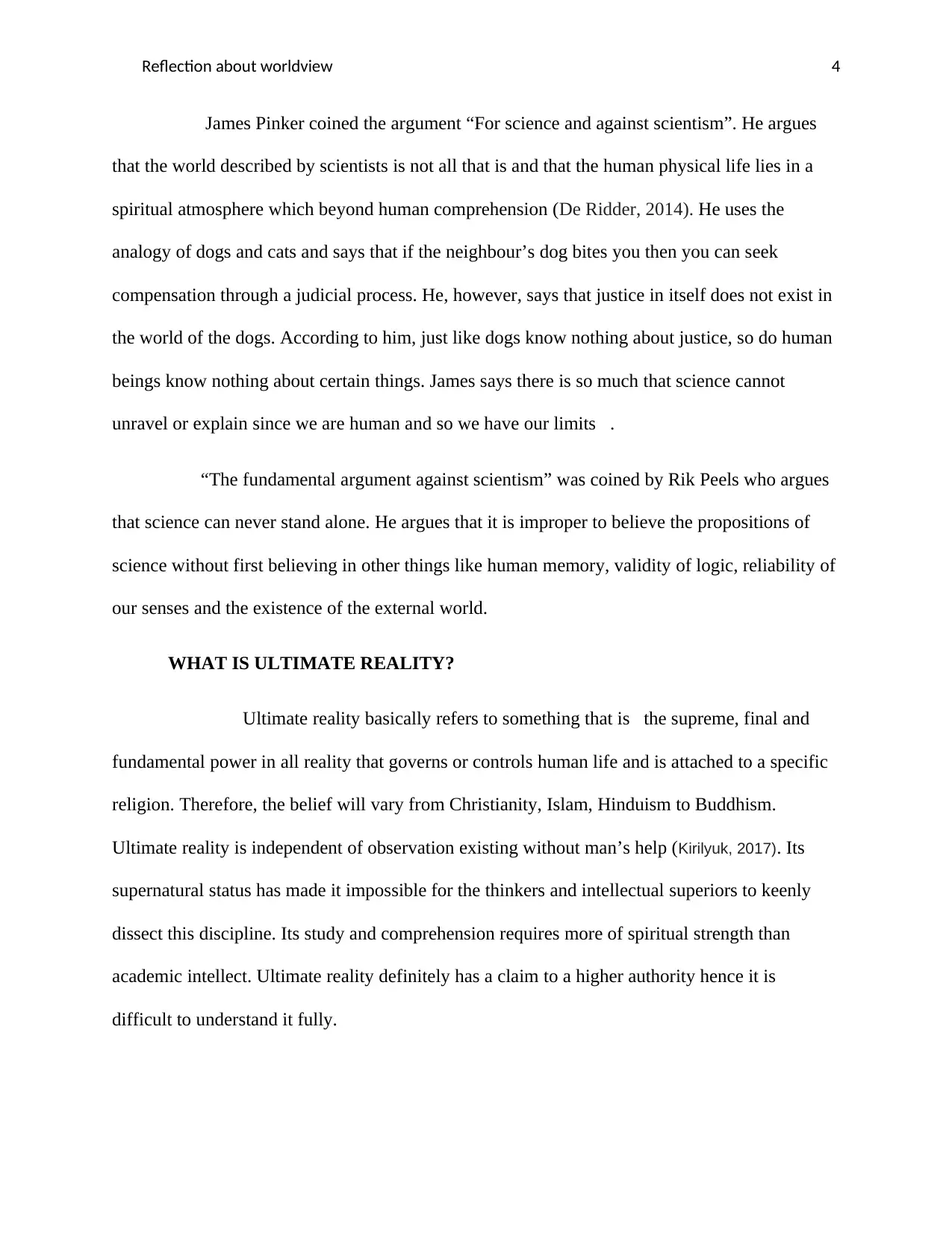
Reflection about worldview 4
James Pinker coined the argument “For science and against scientism”. He argues
that the world described by scientists is not all that is and that the human physical life lies in a
spiritual atmosphere which beyond human comprehension (De Ridder, 2014). He uses the
analogy of dogs and cats and says that if the neighbour’s dog bites you then you can seek
compensation through a judicial process. He, however, says that justice in itself does not exist in
the world of the dogs. According to him, just like dogs know nothing about justice, so do human
beings know nothing about certain things. James says there is so much that science cannot
unravel or explain since we are human and so we have our limits .
“The fundamental argument against scientism” was coined by Rik Peels who argues
that science can never stand alone. He argues that it is improper to believe the propositions of
science without first believing in other things like human memory, validity of logic, reliability of
our senses and the existence of the external world.
WHAT IS ULTIMATE REALITY?
Ultimate reality basically refers to something that is the supreme, final and
fundamental power in all reality that governs or controls human life and is attached to a specific
religion. Therefore, the belief will vary from Christianity, Islam, Hinduism to Buddhism.
Ultimate reality is independent of observation existing without man’s help (Kirilyuk, 2017). Its
supernatural status has made it impossible for the thinkers and intellectual superiors to keenly
dissect this discipline. Its study and comprehension requires more of spiritual strength than
academic intellect. Ultimate reality definitely has a claim to a higher authority hence it is
difficult to understand it fully.
James Pinker coined the argument “For science and against scientism”. He argues
that the world described by scientists is not all that is and that the human physical life lies in a
spiritual atmosphere which beyond human comprehension (De Ridder, 2014). He uses the
analogy of dogs and cats and says that if the neighbour’s dog bites you then you can seek
compensation through a judicial process. He, however, says that justice in itself does not exist in
the world of the dogs. According to him, just like dogs know nothing about justice, so do human
beings know nothing about certain things. James says there is so much that science cannot
unravel or explain since we are human and so we have our limits .
“The fundamental argument against scientism” was coined by Rik Peels who argues
that science can never stand alone. He argues that it is improper to believe the propositions of
science without first believing in other things like human memory, validity of logic, reliability of
our senses and the existence of the external world.
WHAT IS ULTIMATE REALITY?
Ultimate reality basically refers to something that is the supreme, final and
fundamental power in all reality that governs or controls human life and is attached to a specific
religion. Therefore, the belief will vary from Christianity, Islam, Hinduism to Buddhism.
Ultimate reality is independent of observation existing without man’s help (Kirilyuk, 2017). Its
supernatural status has made it impossible for the thinkers and intellectual superiors to keenly
dissect this discipline. Its study and comprehension requires more of spiritual strength than
academic intellect. Ultimate reality definitely has a claim to a higher authority hence it is
difficult to understand it fully.
Paraphrase This Document
Need a fresh take? Get an instant paraphrase of this document with our AI Paraphraser
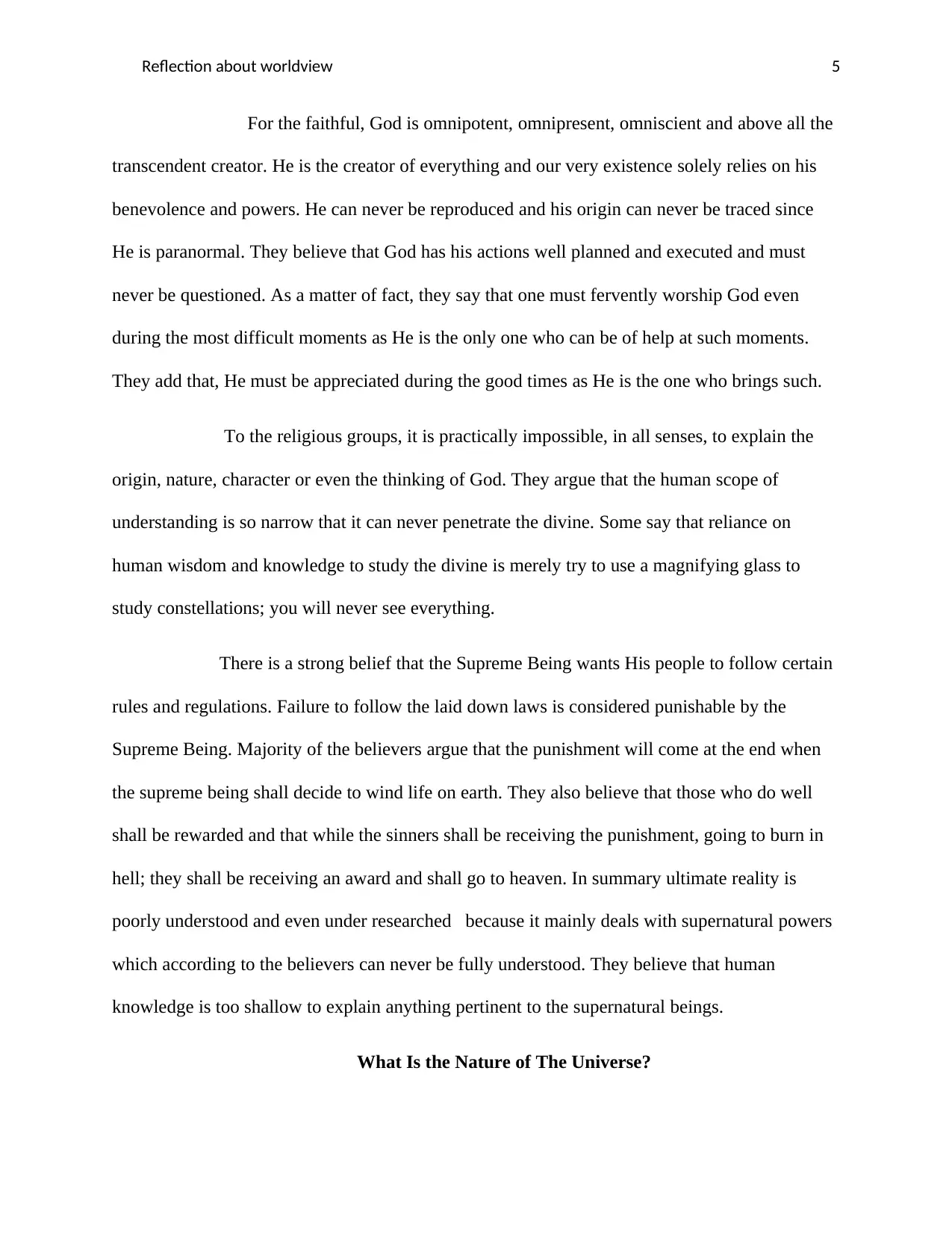
Reflection about worldview 5
For the faithful, God is omnipotent, omnipresent, omniscient and above all the
transcendent creator. He is the creator of everything and our very existence solely relies on his
benevolence and powers. He can never be reproduced and his origin can never be traced since
He is paranormal. They believe that God has his actions well planned and executed and must
never be questioned. As a matter of fact, they say that one must fervently worship God even
during the most difficult moments as He is the only one who can be of help at such moments.
They add that, He must be appreciated during the good times as He is the one who brings such.
To the religious groups, it is practically impossible, in all senses, to explain the
origin, nature, character or even the thinking of God. They argue that the human scope of
understanding is so narrow that it can never penetrate the divine. Some say that reliance on
human wisdom and knowledge to study the divine is merely try to use a magnifying glass to
study constellations; you will never see everything.
There is a strong belief that the Supreme Being wants His people to follow certain
rules and regulations. Failure to follow the laid down laws is considered punishable by the
Supreme Being. Majority of the believers argue that the punishment will come at the end when
the supreme being shall decide to wind life on earth. They also believe that those who do well
shall be rewarded and that while the sinners shall be receiving the punishment, going to burn in
hell; they shall be receiving an award and shall go to heaven. In summary ultimate reality is
poorly understood and even under researched because it mainly deals with supernatural powers
which according to the believers can never be fully understood. They believe that human
knowledge is too shallow to explain anything pertinent to the supernatural beings.
What Is the Nature of The Universe?
For the faithful, God is omnipotent, omnipresent, omniscient and above all the
transcendent creator. He is the creator of everything and our very existence solely relies on his
benevolence and powers. He can never be reproduced and his origin can never be traced since
He is paranormal. They believe that God has his actions well planned and executed and must
never be questioned. As a matter of fact, they say that one must fervently worship God even
during the most difficult moments as He is the only one who can be of help at such moments.
They add that, He must be appreciated during the good times as He is the one who brings such.
To the religious groups, it is practically impossible, in all senses, to explain the
origin, nature, character or even the thinking of God. They argue that the human scope of
understanding is so narrow that it can never penetrate the divine. Some say that reliance on
human wisdom and knowledge to study the divine is merely try to use a magnifying glass to
study constellations; you will never see everything.
There is a strong belief that the Supreme Being wants His people to follow certain
rules and regulations. Failure to follow the laid down laws is considered punishable by the
Supreme Being. Majority of the believers argue that the punishment will come at the end when
the supreme being shall decide to wind life on earth. They also believe that those who do well
shall be rewarded and that while the sinners shall be receiving the punishment, going to burn in
hell; they shall be receiving an award and shall go to heaven. In summary ultimate reality is
poorly understood and even under researched because it mainly deals with supernatural powers
which according to the believers can never be fully understood. They believe that human
knowledge is too shallow to explain anything pertinent to the supernatural beings.
What Is the Nature of The Universe?
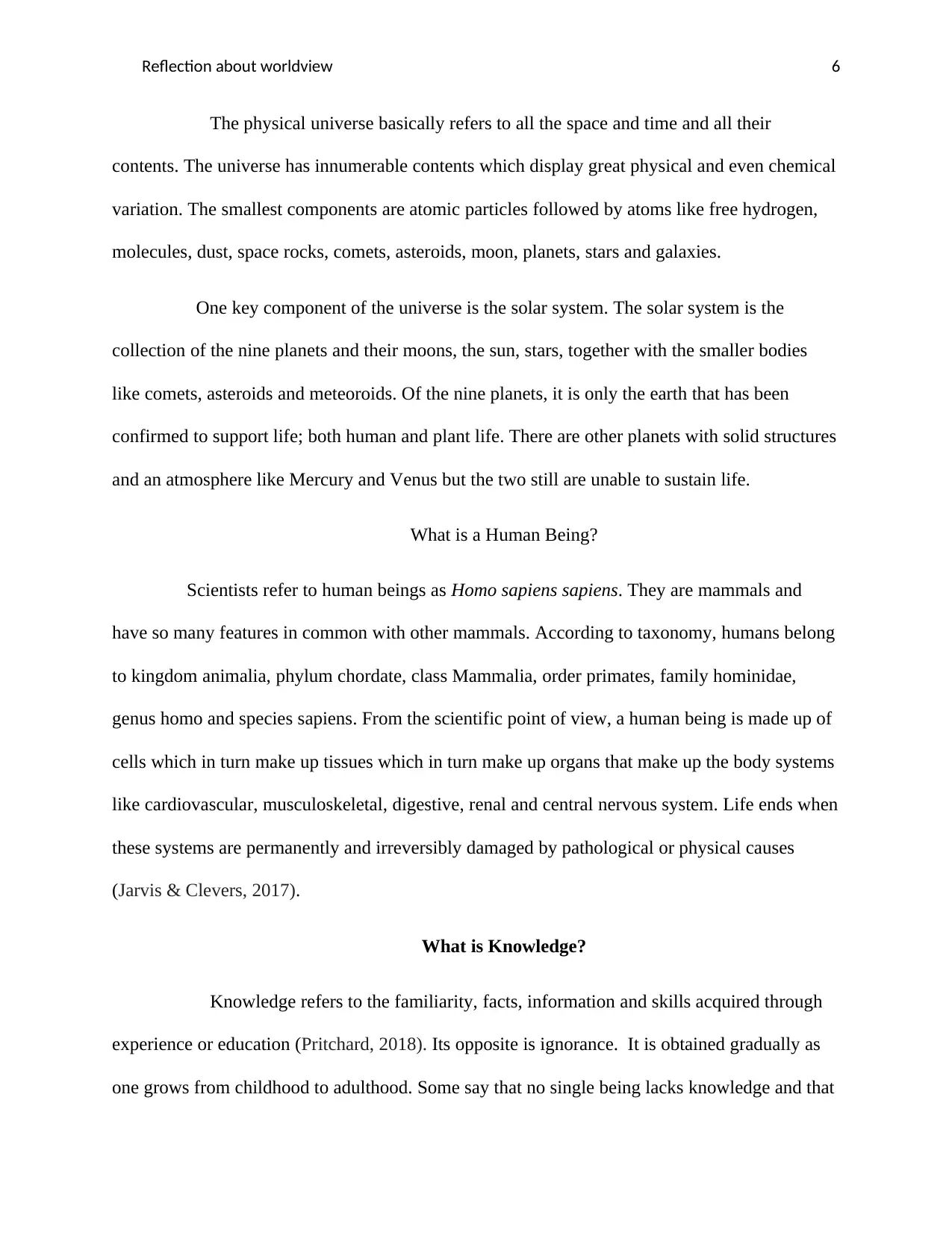
Reflection about worldview 6
The physical universe basically refers to all the space and time and all their
contents. The universe has innumerable contents which display great physical and even chemical
variation. The smallest components are atomic particles followed by atoms like free hydrogen,
molecules, dust, space rocks, comets, asteroids, moon, planets, stars and galaxies.
One key component of the universe is the solar system. The solar system is the
collection of the nine planets and their moons, the sun, stars, together with the smaller bodies
like comets, asteroids and meteoroids. Of the nine planets, it is only the earth that has been
confirmed to support life; both human and plant life. There are other planets with solid structures
and an atmosphere like Mercury and Venus but the two still are unable to sustain life.
What is a Human Being?
Scientists refer to human beings as Homo sapiens sapiens. They are mammals and
have so many features in common with other mammals. According to taxonomy, humans belong
to kingdom animalia, phylum chordate, class Mammalia, order primates, family hominidae,
genus homo and species sapiens. From the scientific point of view, a human being is made up of
cells which in turn make up tissues which in turn make up organs that make up the body systems
like cardiovascular, musculoskeletal, digestive, renal and central nervous system. Life ends when
these systems are permanently and irreversibly damaged by pathological or physical causes
(Jarvis & Clevers, 2017).
What is Knowledge?
Knowledge refers to the familiarity, facts, information and skills acquired through
experience or education (Pritchard, 2018). Its opposite is ignorance. It is obtained gradually as
one grows from childhood to adulthood. Some say that no single being lacks knowledge and that
The physical universe basically refers to all the space and time and all their
contents. The universe has innumerable contents which display great physical and even chemical
variation. The smallest components are atomic particles followed by atoms like free hydrogen,
molecules, dust, space rocks, comets, asteroids, moon, planets, stars and galaxies.
One key component of the universe is the solar system. The solar system is the
collection of the nine planets and their moons, the sun, stars, together with the smaller bodies
like comets, asteroids and meteoroids. Of the nine planets, it is only the earth that has been
confirmed to support life; both human and plant life. There are other planets with solid structures
and an atmosphere like Mercury and Venus but the two still are unable to sustain life.
What is a Human Being?
Scientists refer to human beings as Homo sapiens sapiens. They are mammals and
have so many features in common with other mammals. According to taxonomy, humans belong
to kingdom animalia, phylum chordate, class Mammalia, order primates, family hominidae,
genus homo and species sapiens. From the scientific point of view, a human being is made up of
cells which in turn make up tissues which in turn make up organs that make up the body systems
like cardiovascular, musculoskeletal, digestive, renal and central nervous system. Life ends when
these systems are permanently and irreversibly damaged by pathological or physical causes
(Jarvis & Clevers, 2017).
What is Knowledge?
Knowledge refers to the familiarity, facts, information and skills acquired through
experience or education (Pritchard, 2018). Its opposite is ignorance. It is obtained gradually as
one grows from childhood to adulthood. Some say that no single being lacks knowledge and that
⊘ This is a preview!⊘
Do you want full access?
Subscribe today to unlock all pages.

Trusted by 1+ million students worldwide
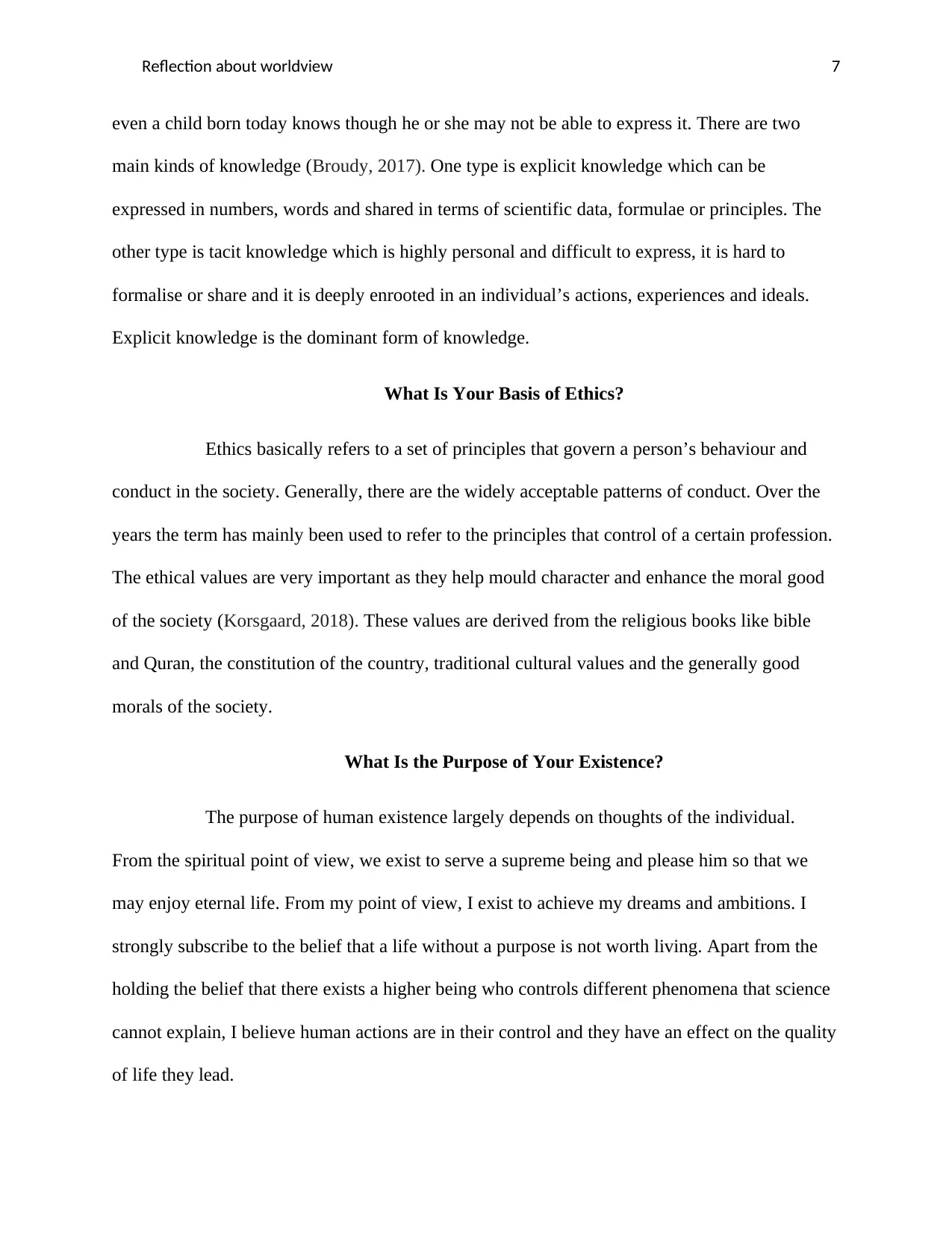
Reflection about worldview 7
even a child born today knows though he or she may not be able to express it. There are two
main kinds of knowledge (Broudy, 2017). One type is explicit knowledge which can be
expressed in numbers, words and shared in terms of scientific data, formulae or principles. The
other type is tacit knowledge which is highly personal and difficult to express, it is hard to
formalise or share and it is deeply enrooted in an individual’s actions, experiences and ideals.
Explicit knowledge is the dominant form of knowledge.
What Is Your Basis of Ethics?
Ethics basically refers to a set of principles that govern a person’s behaviour and
conduct in the society. Generally, there are the widely acceptable patterns of conduct. Over the
years the term has mainly been used to refer to the principles that control of a certain profession.
The ethical values are very important as they help mould character and enhance the moral good
of the society (Korsgaard, 2018). These values are derived from the religious books like bible
and Quran, the constitution of the country, traditional cultural values and the generally good
morals of the society.
What Is the Purpose of Your Existence?
The purpose of human existence largely depends on thoughts of the individual.
From the spiritual point of view, we exist to serve a supreme being and please him so that we
may enjoy eternal life. From my point of view, I exist to achieve my dreams and ambitions. I
strongly subscribe to the belief that a life without a purpose is not worth living. Apart from the
holding the belief that there exists a higher being who controls different phenomena that science
cannot explain, I believe human actions are in their control and they have an effect on the quality
of life they lead.
even a child born today knows though he or she may not be able to express it. There are two
main kinds of knowledge (Broudy, 2017). One type is explicit knowledge which can be
expressed in numbers, words and shared in terms of scientific data, formulae or principles. The
other type is tacit knowledge which is highly personal and difficult to express, it is hard to
formalise or share and it is deeply enrooted in an individual’s actions, experiences and ideals.
Explicit knowledge is the dominant form of knowledge.
What Is Your Basis of Ethics?
Ethics basically refers to a set of principles that govern a person’s behaviour and
conduct in the society. Generally, there are the widely acceptable patterns of conduct. Over the
years the term has mainly been used to refer to the principles that control of a certain profession.
The ethical values are very important as they help mould character and enhance the moral good
of the society (Korsgaard, 2018). These values are derived from the religious books like bible
and Quran, the constitution of the country, traditional cultural values and the generally good
morals of the society.
What Is the Purpose of Your Existence?
The purpose of human existence largely depends on thoughts of the individual.
From the spiritual point of view, we exist to serve a supreme being and please him so that we
may enjoy eternal life. From my point of view, I exist to achieve my dreams and ambitions. I
strongly subscribe to the belief that a life without a purpose is not worth living. Apart from the
holding the belief that there exists a higher being who controls different phenomena that science
cannot explain, I believe human actions are in their control and they have an effect on the quality
of life they lead.
Paraphrase This Document
Need a fresh take? Get an instant paraphrase of this document with our AI Paraphraser
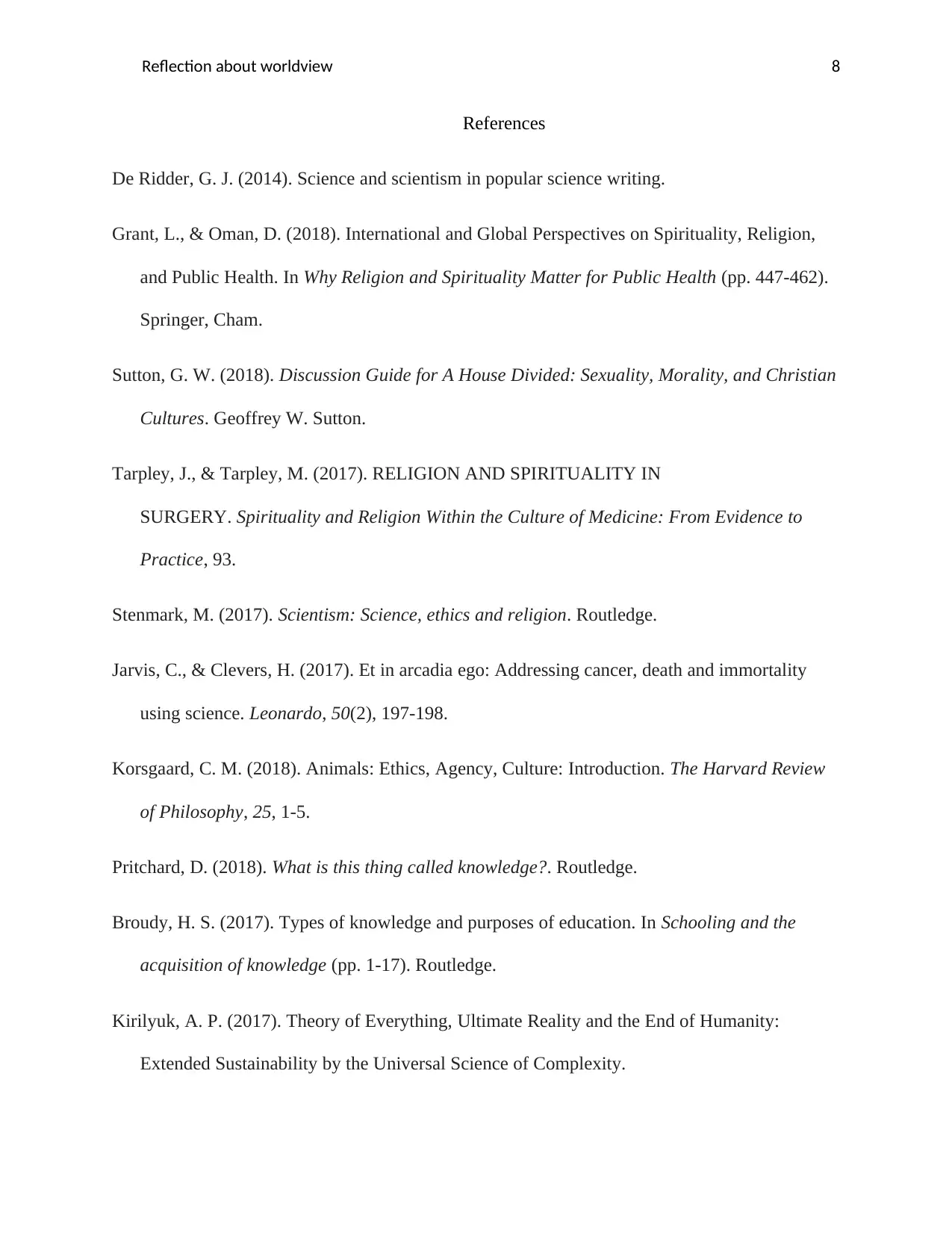
Reflection about worldview 8
References
De Ridder, G. J. (2014). Science and scientism in popular science writing.
Grant, L., & Oman, D. (2018). International and Global Perspectives on Spirituality, Religion,
and Public Health. In Why Religion and Spirituality Matter for Public Health (pp. 447-462).
Springer, Cham.
Sutton, G. W. (2018). Discussion Guide for A House Divided: Sexuality, Morality, and Christian
Cultures. Geoffrey W. Sutton.
Tarpley, J., & Tarpley, M. (2017). RELIGION AND SPIRITUALITY IN
SURGERY. Spirituality and Religion Within the Culture of Medicine: From Evidence to
Practice, 93.
Stenmark, M. (2017). Scientism: Science, ethics and religion. Routledge.
Jarvis, C., & Clevers, H. (2017). Et in arcadia ego: Addressing cancer, death and immortality
using science. Leonardo, 50(2), 197-198.
Korsgaard, C. M. (2018). Animals: Ethics, Agency, Culture: Introduction. The Harvard Review
of Philosophy, 25, 1-5.
Pritchard, D. (2018). What is this thing called knowledge?. Routledge.
Broudy, H. S. (2017). Types of knowledge and purposes of education. In Schooling and the
acquisition of knowledge (pp. 1-17). Routledge.
Kirilyuk, A. P. (2017). Theory of Everything, Ultimate Reality and the End of Humanity:
Extended Sustainability by the Universal Science of Complexity.
References
De Ridder, G. J. (2014). Science and scientism in popular science writing.
Grant, L., & Oman, D. (2018). International and Global Perspectives on Spirituality, Religion,
and Public Health. In Why Religion and Spirituality Matter for Public Health (pp. 447-462).
Springer, Cham.
Sutton, G. W. (2018). Discussion Guide for A House Divided: Sexuality, Morality, and Christian
Cultures. Geoffrey W. Sutton.
Tarpley, J., & Tarpley, M. (2017). RELIGION AND SPIRITUALITY IN
SURGERY. Spirituality and Religion Within the Culture of Medicine: From Evidence to
Practice, 93.
Stenmark, M. (2017). Scientism: Science, ethics and religion. Routledge.
Jarvis, C., & Clevers, H. (2017). Et in arcadia ego: Addressing cancer, death and immortality
using science. Leonardo, 50(2), 197-198.
Korsgaard, C. M. (2018). Animals: Ethics, Agency, Culture: Introduction. The Harvard Review
of Philosophy, 25, 1-5.
Pritchard, D. (2018). What is this thing called knowledge?. Routledge.
Broudy, H. S. (2017). Types of knowledge and purposes of education. In Schooling and the
acquisition of knowledge (pp. 1-17). Routledge.
Kirilyuk, A. P. (2017). Theory of Everything, Ultimate Reality and the End of Humanity:
Extended Sustainability by the Universal Science of Complexity.
1 out of 8
Related Documents
Your All-in-One AI-Powered Toolkit for Academic Success.
+13062052269
info@desklib.com
Available 24*7 on WhatsApp / Email
![[object Object]](/_next/static/media/star-bottom.7253800d.svg)
Unlock your academic potential
Copyright © 2020–2026 A2Z Services. All Rights Reserved. Developed and managed by ZUCOL.




